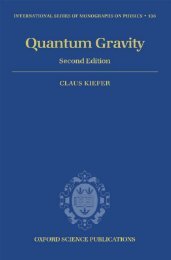Three Roads To Quantum Gravity
Three Roads To Quantum Gravity
Three Roads To Quantum Gravity
You also want an ePaper? Increase the reach of your titles
YUMPU automatically turns print PDFs into web optimized ePapers that Google loves.
72 THREE ROADS TO QUANTUM GRAVITY<br />
of all the black holes in the universe, but there may be other<br />
regions hidden as well. For example, if the rate at which the<br />
universe expands increases with time, there will be regions of<br />
the universe from which we shall never receive light signals,<br />
no matter how long we wait. A photon from such a region may<br />
be travelling in our direction at the speed of light, but because<br />
of the increase in the rate of the expansion of the universe it<br />
will always have more distance to travel towards us than it<br />
has travelled so far. As long as the expansion continues to<br />
accelerate, the photon will never reach us. Unlike black holes,<br />
the hidden regions produced by the acceleration of the<br />
expansion of the universe depend on the history of each<br />
observer. For each observer there is a hidden region, but they<br />
are different for different observers.<br />
This raises an interesting philosophical point, because<br />
objectivity is usually assumed to be connected with observer<br />
independence. It is commonly assumed that anything that is<br />
observer dependent is subjective, meaning that it is not<br />
quite real. But the belief that observer dependence rules<br />
out objectivity is a residue of an older philosophy, usually<br />
associated with the name of Plato, according to which truth<br />
resides not in our world but in an imaginary world consisting<br />
of all ideas which are eternally true. According to this<br />
philosophy, anybody could have access to any truth about the<br />
world, because the process of ®nding truth was held to be<br />
akin to a process of remembering, rather than observing. This<br />
philosophy is hard to square with Einstein's general theory of<br />
relativity because, in a universe de®ned by that theory,<br />
something may be both objectively true and at the same<br />
time knowable only by some observers and not others. So<br />
`objectivity' is not the same as `knowable by all'. A weaker,<br />
less stringent interpretation is required: that all those observers<br />
who are in a position to ascertain the truth or falsity of<br />
some observation should agree with one another.<br />
The hidden region of any observer has a boundary that<br />
divides the part of the universe they can see from the part they<br />
cannot. As with a black hole, this boundary is called the<br />
horizon. Like the invisible regions, horizons are observer<br />
dependent concepts. For any observer who remains outside


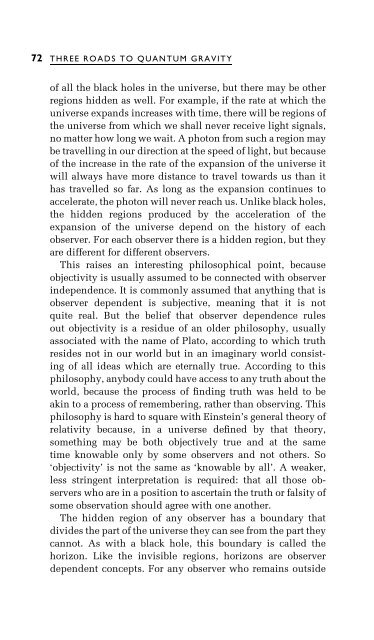
![arXiv:1001.0993v1 [hep-ph] 6 Jan 2010](https://img.yumpu.com/51282177/1/190x245/arxiv10010993v1-hep-ph-6-jan-2010.jpg?quality=85)


![arXiv:1008.3907v2 [astro-ph.CO] 1 Nov 2011](https://img.yumpu.com/48909562/1/190x245/arxiv10083907v2-astro-phco-1-nov-2011.jpg?quality=85)

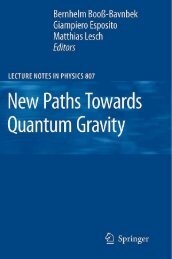



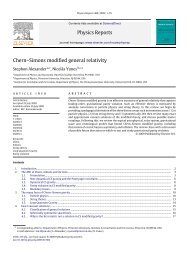
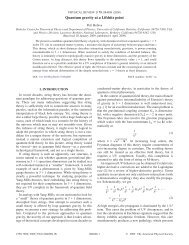

![arXiv:1002.4928v1 [gr-qc] 26 Feb 2010](https://img.yumpu.com/41209516/1/190x245/arxiv10024928v1-gr-qc-26-feb-2010.jpg?quality=85)
![arXiv:1206.2653v1 [astro-ph.CO] 12 Jun 2012](https://img.yumpu.com/39510078/1/190x245/arxiv12062653v1-astro-phco-12-jun-2012.jpg?quality=85)
